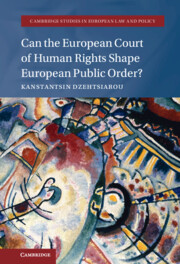2 results
3 - Collective Responsibility for European Public Order
-
- Book:
- European Human Rights Grey Zones
- Published online:
- 18 April 2024
- Print publication:
- 25 April 2024, pp 62-94
-
- Chapter
- Export citation

Can the European Court of Human Rights Shape European Public Order?
-
- Published online:
- 25 November 2021
- Print publication:
- 02 December 2021

